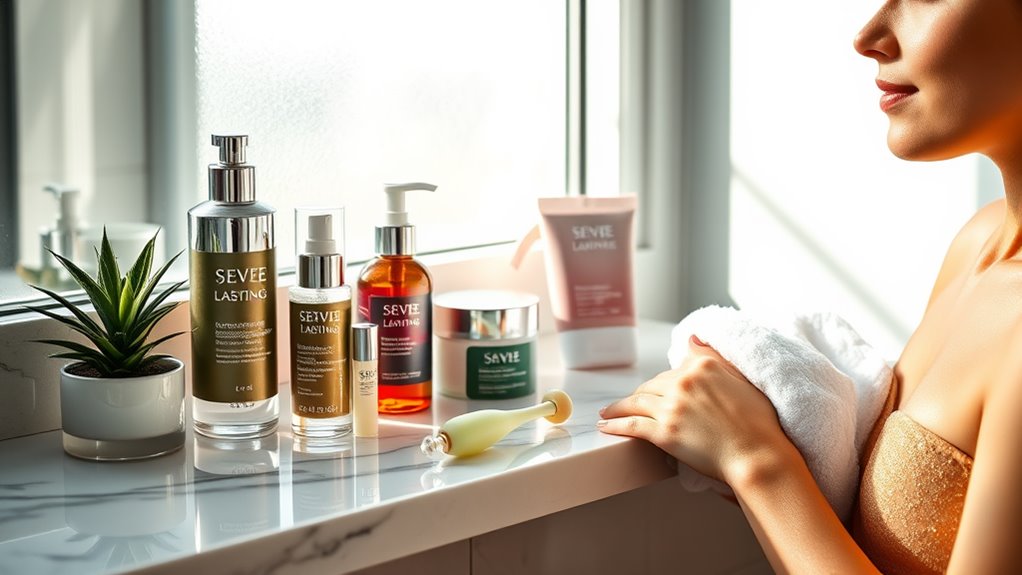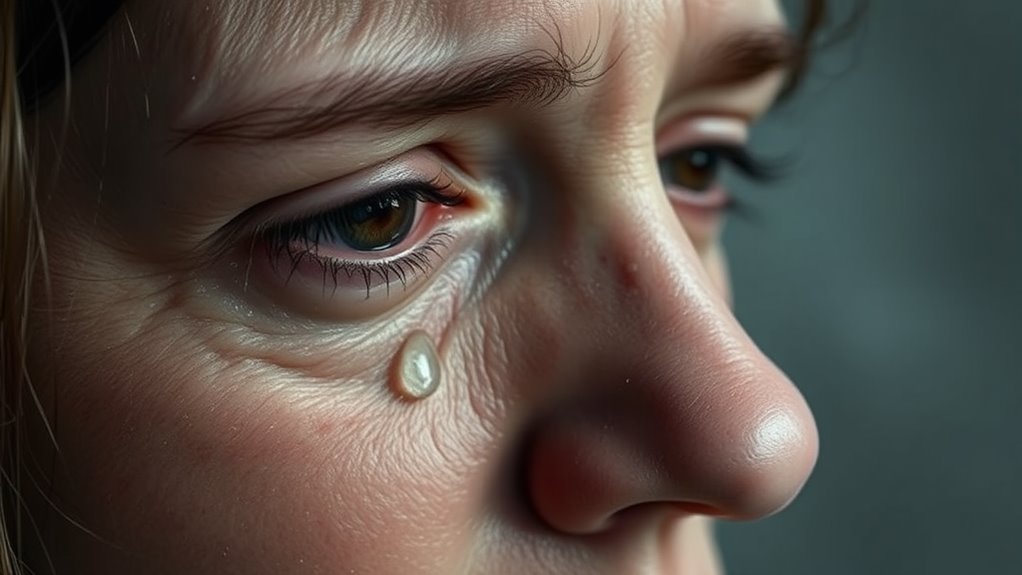Why You Should Never Sleep With Dirty Hair (for Skin’s Sake)
Sleeping with dirty hair can lead to serious skin issues. The oils, dirt, and bacteria that accumulate on your hair can clog pores, resulting in breakouts and irritation. Residual hair products can further irritate sensitive skin. A clean scalp promotes healthier hair and better skin by reducing the risk of infections and dullness. By adopting a regular hair care routine, you can enhance your overall skin health. Discover more ways to improve your hair and skin connection.
Key Takeaways
- Dirty hair transfers oils and bacteria to your skin, increasing the risk of breakouts and irritation.
- Accumulated grime from hair can clog facial pores, leading to dullness and unwanted blemishes.
- Hair products left in your hair overnight may irritate sensitive facial skin and worsen skin issues.
- Sleeping with dirty hair promotes an environment for bacteria, which can lead to skin infections.
- Regularly washing your hair helps maintain a clearer complexion and enhances overall skin health.
The Connection Between Hair and Skin Health
While you mightn’t realize it, the health of your hair directly impacts the condition of your skin. When you’re sleeping with dirty hair, you’re exposing your skin to a variety of impurities, including dirt, oil, and product buildup.
These elements can clog your pores, leading to breakouts and irritation. Additionally, your hair can transfer bacteria and allergens to your pillowcase, creating an unfavorable environment for your skin. This connection emphasizes the importance of maintaining clean hair to support overall skin health. By ensuring your hair is clean before bed, you can reduce the risk of skin issues and promote a clearer complexion.
Dirty hair can also contribute to skin health issues, further underscoring the need for proper hair hygiene. Prioritizing hair hygiene not only benefits your locks but also enhances the vitality of your skin.
How Dirt and Oil Accumulate in Hair
As you apply various hair products, residue builds up over time, leading to a dull appearance and potential scalp issues.
Your scalp naturally produces oils that can also accumulate, creating an environment for dirt and bacteria.
Understanding how these factors contribute to hair health is essential for maintaining clean, vibrant hair.
Hair Product Residue
When you style your hair with various products, residue can build up over time, leading to dirt and oil accumulation.
This residue can impact not only your hair’s appearance but also your skin’s health, especially if you sleep with dirty hair.
To maintain both your hair and skin, consider the following:
- Choose lightweight products that don’t leave heavy residues.
- Wash your hair regularly to remove buildup effectively.
- Rinse thoroughly to ensure all product is washed away.
- Opt for clarifying shampoos periodically to eliminate stubborn residue.
Natural Oil Buildup
Natural oil buildup in your hair can occur quickly, especially if you frequently go without washing. Sebum, the natural oil produced by your scalp, accumulates over time, leading to greasy hair and a dull appearance.
This buildup not only affects your hair’s aesthetics but also creates an environment conducive to dirt, dust, and pollutants clinging to your strands. When you sleep with dirty hair, these contaminants can transfer to your skin, potentially causing breakouts and irritation.
Additionally, excess oil can clog hair follicles, hindering healthy hair growth. To maintain both hair and skin health, develop a consistent washing routine that suits your hair type and lifestyle.
Prioritizing cleanliness ensures your hair remains vibrant while protecting your skin from unwanted issues.
The Impact of Dirty Hair on Facial Skin
Dirty hair doesn’t just affect your scalp; it can also wreak havoc on your facial skin.
When you sleep with unclean hair, you expose your face to various issues, primarily caused by dirt, oil, and product buildup.
Here’s how dirty hair impacts your skin:
-
Increased Oil Transfer: Oils from your hair can clog pores on your face.
-
Bacterial Growth: Hair can harbor bacteria, which may lead to skin infections.
-
Allergic Reactions: Residual hair products can irritate sensitive facial skin.
-
Dullness and Breakouts: Accumulated grime can lead to dull skin and unwanted blemishes.
Additionally, the type of pillowcase material you use can exacerbate these skin issues by trapping oils and bacteria.
To maintain healthy skin, prioritize clean hair before bedtime.
Your complexion will thank you for it.
Common Skin Issues Linked to Dirty Hair
If you’ve ever woken up with unexpected breakouts or irritated skin, it might stem from the condition of your hair. Dirty hair can transfer oils, dirt, and bacteria to your skin, leading to several common issues. Here’s a quick overview of how unclean hair can affect your complexion:
| Skin Issue | Cause | Prevention |
|---|---|---|
| Acne | Blocked pores from hair oils | Wash your hair regularly |
| Irritation | Skin contact with dirty hair | Keep hair clean and tied back |
| Dullness | Build-up of impurities | Exfoliate skin frequently |
Additionally, sleeping with dirty hair can contribute to clogged pores, which may exacerbate skin issues.
The Role of Hair Products in Skin Health
When you use hair products, it’s essential to consider how their residue can affect your skin health.
Leftover product can clog pores, leading to breakouts or irritation on your scalp and face.
Product Residue Impact
Though you may not realize it, the hair products you use can significantly impact your skin health. When you sleep with dirty hair, product residue can transfer to your skin, leading to various issues.
Here are some potential effects of hair product residue on your skin:
-
Irritation: Chemicals in hair products can cause inflammation or redness.
-
Allergic Reactions: Ingredients might trigger reactions, especially if you have sensitive skin.
-
Dullness: Product build-up can dull your complexion, making it appear lifeless.
-
Unwanted Odors: Residual scents from products can linger on your skin, affecting your overall freshness.
To maintain optimal skin health, ensure you cleanse your hair regularly, minimizing product residue before bedtime.
Clogged Pores Consequences
While you may not think about it, leaving hair products in your hair overnight can lead to clogged pores on your skin. These products often contain oils, silicones, and fragrances that can transfer to your pillowcase and subsequently your skin. The consequences of clogged pores can range from acne breakouts to dull skin. Understanding the impact of hair products on skin health is crucial for maintaining a radiant complexion.
| Hair Product Type | Skin Impact | Recommendation |
|---|---|---|
| Oils | Clogs pores, causes acne | Use lightweight formulas |
| Silicones | Traps dirt and debris | Wash hair before bed |
| Fragrances | Irritates sensitive skin | Opt for fragrance-free |
The Importance of a Nightly Hair Care Routine
Maintaining a nightly hair care routine is essential for ensuring your locks stay healthy and vibrant.
By dedicating a few minutes each night to your hair, you can significantly enhance its overall condition and appearance.
Here’s what you should focus on:
-
Detangling: Gently remove knots and tangles to prevent breakage.
-
Moisturizing: Apply a leave-in conditioner or hair oil to hydrate your strands.
-
Protecting: Use a silk or satin pillowcase to minimize friction and prevent damage.
-
Scalp Care: Massage your scalp to promote blood circulation and stimulate hair growth.
These steps won’t only keep your hair looking its best but also contribute to a more restful sleep, free from the worries of damaged locks.
How to Properly Cleanse Your Hair Before Bed
How can you ensure your hair is clean and ready for a restful night’s sleep? Start by thoroughly wetting your hair with warm water, as this helps to open the cuticles.
Apply a high-quality sulfate-free shampoo, focusing on your scalp. Gently massage it in for at least a minute to remove dirt and product buildup. Rinse thoroughly, ensuring no residue remains.
Follow with a nourishing conditioner, applying it only to the mid-lengths and ends to avoid weighing down your roots. After a few minutes, rinse with cool water to seal the cuticles.
Lastly, gently towel-dry your hair, avoiding vigorous rubbing. This will prepare your hair for a healthier sleep, free from the toxins that can disrupt your skin’s balance.
Benefits of Sleeping With Clean Hair
Sleeping with clean hair offers numerous benefits that contribute to both your hair’s health and your overall well-being.
By prioritizing cleanliness, you can experience the following advantages:
-
Reduced Breakage: Clean hair is less prone to tangling and breakage, promoting healthier growth.
-
Better Scalp Health: Washing your hair removes excess oils and dirt, preventing scalp issues like dandruff.
-
Enhanced Product Absorption: Clean hair absorbs treatments and conditioners more effectively, maximizing their benefits.
-
Improved Sleep Quality: A fresh feeling can lead to a more restful sleep, free from allergens and irritants. Additionally, better sleep habits can significantly enhance your skin’s radiance and overall health.
Incorporating these practices into your nightly routine not only elevates your hair care but also enhances your overall skin health, ensuring you wake up rejuvenated.
Natural Remedies for Hair and Skin Care
As you explore natural remedies for hair and skin care, you’ll discover a wealth of effective options that harness the power of nature. Here are a few remedies to consider:
| Remedy | Benefits | Application |
|---|---|---|
| Coconut Oil | Deep conditioning | Apply to hair, leave for 30 mins before washing |
| Aloe Vera | Soothes skin irritation | Use as a topical gel for rashes or sunburn |
| Honey | Natural humectant | Mix with water for a hydrating face mask |
Incorporating these remedies into your routine can enhance your hair’s luster and improve your skin’s texture. By embracing these natural options, you can achieve beautiful hair and skin without harsh chemicals, fostering a healthier, more radiant appearance. Additionally, be mindful of certain foods that may act as unseen food triggers for acne, as they could impact your skin’s health.
Tips for Maintaining Healthy Hair
To maintain healthy hair, establish a regular washing schedule that suits your hair type and lifestyle.
Using gentle products can prevent damage and keep your locks looking vibrant.
With the right care, you’ll enhance your hair’s natural beauty and strength.
Regular Washing Schedule
Maintaining a regular washing schedule is crucial for promoting healthy hair and scalp. Establishing a routine helps remove dirt, oil, and product buildup, ensuring your hair stays vibrant and clean.
Here are some tips to consider:
-
Assess your hair type****: Oily hair may require more frequent washing, while dry hair benefits from less frequent cleansing.
-
Choose the right frequency****: Aim for washing every 2-3 days, adjusting as necessary based on your hair’s response.
-
Listen to your scalp: If it feels itchy or greasy, it’s likely time to wash.
-
Stay consistent: Consistency helps your scalp regulate oil production, leading to healthier hair over time.
Use Gentle Products
Choosing gentle products is essential for maintaining healthy hair, especially if you wash frequently. Harsh shampoos and conditioners can strip your hair of its natural oils, leading to dryness and breakage.
Opt for sulfate-free formulas, as they cleanse without over-drying. Look for products infused with natural ingredients like aloe vera, coconut oil, or shea butter, which nourish and hydrate your strands.
When selecting styling products, prioritize those free from alcohol and parabens, as these can cause irritation and damage over time. Additionally, always perform a patch test when trying new products to avoid adverse reactions.
The Importance of Pillowcase Hygiene
While you may not think about it often, the hygiene of your pillowcase plays a crucial role in your overall hair and skin health. A dirty pillowcase can harbor bacteria, oils, and dead skin cells that can lead to breakouts and dull hair.
To maintain optimal hygiene, consider the following practices:
- Wash your pillowcase weekly to eliminate dirt and oil buildup.
- Choose breathable fabrics**** like cotton to reduce moisture retention.
- Flip or change pillowcases frequently if you notice acne or irritation.
- Consider hypoallergenic options to minimize allergens and irritants.
Long-Term Effects of Neglecting Hair and Skin Care
Neglecting proper hair and skin care can lead to a cascade of long-term effects that impact your appearance and overall health. Dirty hair can result in scalp issues, while unwashed skin accumulates dirt and oil, leading to breakouts and premature aging. The consequences extend beyond aesthetics; they can affect your confidence and interpersonal relationships.
| Effect | Description | Prevention |
|---|---|---|
| Dull Hair | Lack of shine and vibrancy | Regular washing and conditioning |
| Scalp Conditions | Issues like dandruff and irritation | Scalp care routines |
| Acne Breakouts | Clogged pores from dirt and oil | Consistent cleansing |
| Premature Aging | Increased fine lines and wrinkles | Hydration and sun protection |
Prioritizing hair and skin care is essential for a healthier, more vibrant you.




